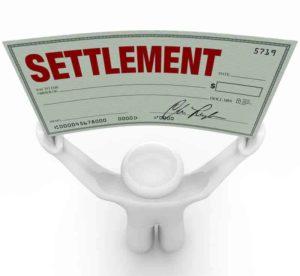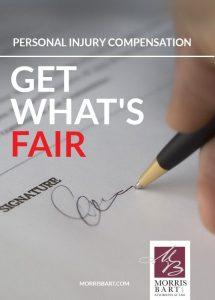If you get injured in an accident resulting in injuries, you can file an insurance claim or a personal injury lawsuit to recover your financial losses. Most injury claims will settle out of court. But how do you know if the settlement offer you receive is reasonable?
The simple answer is that there is no simple answer. A settlement that’s fair and reasonable for one case may not be suitable for your case. Learn about the factors you should consider before accepting a settlement offer.

Multiple Factors May Affect Your Settlement Offer
Always remember that a settlement is just that, settling. The insurance company will probably not be happy about giving you any amount of money. Likewise, you will probably not be satisfied with the amount that you get offered.
Settlements can be tricky and depend upon several variables.
- What jurisdiction are you in?
- How long have you undergone treatment?
- What is the extent of your injuries?
- Are you fully healed at the time of the settlement offer?
- Have your property damage issues been fully resolved?
- What are the policy limits of the opposing party and your own insurance coverage?
Even these questions presuppose liability and causation issues. When the insurance company is ready to settle, the guidance of an experienced New Orleans personal injury lawyer can be invaluable in deciding whether or not to accept a settlement offer. First, however, you can take a look at your case to get a basic understanding of what a fair offer from an insurance company might be.
For a free legal consultation, call 800-537-8185
Determine the Extent of Your Injuries
If you were in a car accident and sustained injuries, document the time and money you have spent on medical treatment. This is often quantifiable. It may just be a matter of keeping a record of:
- Doctor’s visits
- Prescription costs
- Property loss
- Time off of work
Special damages are those that are easily quantifiable – medical and prescription bills, mileage to and from the doctor or pharmacy, missed work, etc.
General damages are a bit more subjective. They typically include pain and suffering, loss of quality of life, or loss of time with friends and family fall into this category. A relatively conservative estimate for “pain and suffering” is $1,000.00 per month while actively seeking treatment.
Be Certain that You Are at a State of Maximum Cure
To properly assess the settlement you need, you want to be at a state of maximum recovery or, at the very least, a position that you are comfortable with regarding your physical health. If money is “on the table,” so to speak, you do not want to settle your claim if you are not comfortable with the amount or degree of treatment that you have received.
If you are not finished with your medical treatment but want to pursue a settlement, take into account your possible future medical costs as well as pain and suffering. Your doctor should be able to advise you as to the extent of your injuries and the possible future treatments necessary.
Your attorney should be able to give you some idea as to what “future medicals” have gotten awarded for similar injuries in past cases.
Click to contact our personal injury lawyers today
Settle Your Property Damage Issues Properly
If you were in a car accident, never allow your vehicle to sit idly in a body shop or at a mechanic’s. These businesses charge storage fees, and those fees grow fast. Instead, have your insurer, or the other party’s insurer, promptly assess the damage to your vehicle and bring it to a location where storage fees will not be an issue.
If Your Vehicle Is a Total Loss
If the vehicle is considered totaled, the insurance companies almost always go by the National Automobile Dealers Association (NADA) value of the car in making restitution. If your car has unique or custom parts, advise the adjuster.
Also, be aware that if the insurer decides your car is totaled, you have options if you disagree. You can ask for the cash value minus what is known as the salvage amount.
If a Driver Is Underinsured
Just because an accident is the fault of another person, that person’s insurer may not be able to cover all of your damages. For example, in the state of Louisiana, drivers are only required by law to carry $15,000 of liability insurance. However, these policy limits can add up quickly when a severe accident occurs.
For this reason, many drivers carry uninsured/underinsured motorist (UM) insurance coverage. This coverage ensures a driver or their passengers against the risk of severe injury or the inability of a liable party to meet the damages connected with the accident.
Many people are unwilling, or even afraid, to utilize their UM insurance for fear of retribution from their own insurer. However, the fact of the matter is that Louisiana Statutory law prohibits any insurer from adjusting the premiums of their insured for the use of their UM coverage.
Treatment Is Key
If you are injured, you need to go to the doctor and keep track of those bills. Between work and family, it may be challenging to take the time for medical appointments. However, if you want to build a case, you have to seek treatment.
You cannot build a case and claim damages without showing you received treatment. There is simply no other way to prove injury than to show that you went to the doctor.
Do You Need a Lawyer to Get a Good Settlement Offer?
You do not need to hire a lawyer to secure a settlement. Just remember that finalizing a case can be tricky, and the reasonableness of an offer depends on your needs. Your lawyer can:
- Total your past and future treatment expenses
- Communicate with insurance on your behalf
- Negotiate for the best settlement offer
Your best course of action may be to hire an experienced attorney to help guide you through all the pitfalls you may encounter.
How Much Is the Average Personal Injury Settlement?
The average settlement for a personal injury case is about $21,000. Keep in mind that this may not reflect the settlement you get offered. Some cases settle for as little as $3,000.
It may be a good idea not to accept the first settlement you get offered. Insurance companies often throw out lowball offers, hoping you are desperate for any amount you can get. In addition, settlements can often be negotiated, so you shouldn’t accept an offer without your lawyer reviewing it.
How does a Settlement Get Paid Out?
Money from a personal injury settlement may get paid out as a one-time lump sum or a series of payments in the form of a structured settlement. While structured settlements can be customized to suit your needs, you may not be able to change the terms later.
How Long does It Take to Get Paid After a Settlement?
How long you have to wait for your settlement money will depend on your particular case. After your claim has been resolved and settlement negotiations are finished, you may receive funds in as little as one week. On the other hand, you may have to wait as long as six weeks. Additional delays are not uncommon.
Do You Pay Taxes on Settlements?
The money you receive from your case, including your settlement, may be considered part of your gross income. The Internal Revenue Service (IRS) will typically tax this income. Exceptions to this rule include personal injury case settlements, such as:
- Car accidents
- Workplace accidents
- Slip and fall cases
- Medical malpractice
Under 26 C.F.R. §1.104-1, the compensation you receive for physical injuries or illness is not included in your gross income and is not taxable. However, punitive damages are taxable. Your lawyer can review your settlement or court award to determine if you have to pay taxes on any of it.
Always Remember the Statute of Limitations
One thing that often gets overlooked when it comes to pursuing financial compensation is the statute of limitations. Each state has its own time limit on how long you have to file a claim. If you pass this time limit, you can’t file a claim anymore and will forfeit your ability to win a settlement.
You should never wait until the last minute to start filing your claim. To increase your chances of getting the best settlement possible, always prepare your case early and be mindful of the statute of limitations in your state. As more time passes, it will become harder for you to win a fair settlement that accurately reflects the damages you sustained.
Get Help from a Personal Injury Lawyer Today
Even though there’s no legal requirement to hire a lawyer when you pursue a settlement, you should still do so. Hiring a lawyer is one of the best decisions you can make to ensure that you get a reasonable settlement offer that covers your damages. The personal injury lawyers here at Morris Bart are ready to help. Contact us today to learn more about your legal options and what we can do to assist.
Questions?Call 800-537-8185
to find a Morris Bart office near you.




